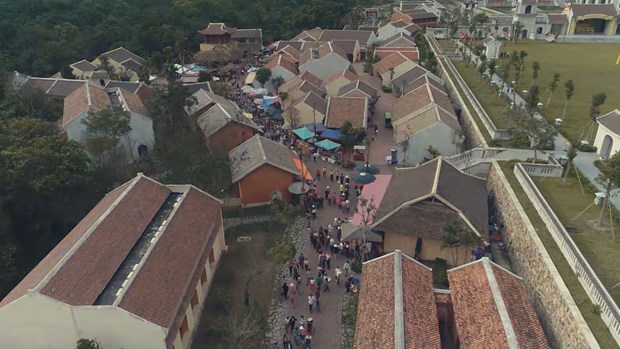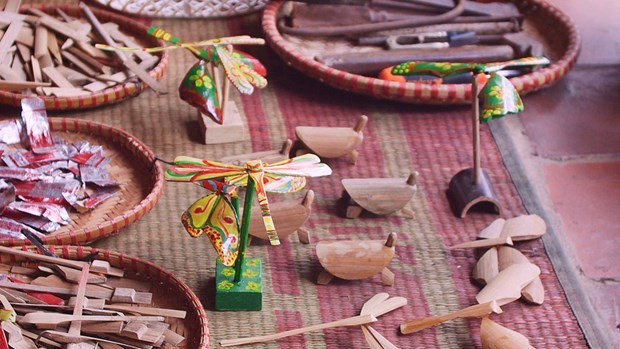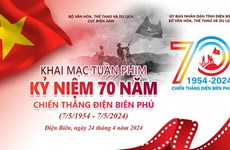Discovering craft villages in Buddhist centre in Quang Ninh
Coming to Yen Tu relic site in Quang Ninh province – Vietnam’s major Buddhist centre, tourists can also experience traditional crafts such as making hats, bamboo handicrafts, and wood carvings.
 Nuong village in Yen Tu (Photo: baoquangninh.com.vn)
Nuong village in Yen Tu (Photo: baoquangninh.com.vn)Setting foot in Nuong village of Yen Tu, visitors will be deeply impressed by the image of shops and stalls selling handicraft products of local trade villages such as conical hat making, Dong Ho folk paintings, or bamboo dragonflies along two sides of the road cutting through the village.
In his six-day trip to discover the beauty of the northern region, Tran Hoang Dong, a tourist from the southern province of Dong Thap, travelled to Yen Tu. This is his second stop in Quang Ninh, after Ha Long Bay – a UNESCO-recognised World Natural Heritage. With only four hours in Yen Tu, he had not much time for Nuong village, but it was still enough for him to try making bamboo dragonflies and colouring them by himself.
 Bamboo dragonfly making in Nuong village (Photo: VNA)
Bamboo dragonfly making in Nuong village (Photo: VNA)Local trade villages attract not only domestic tourists, but also foreigners. Gaya Rota Baldezamo, a holiday-maker from the Phillippines, stated that during his working trip to Yen Tu in August 2019, she directly watch artisan Pham Thanh Luong in Uong Bi city’s Thuong Yen Cong commune making conical hats by hand.
Nguyen Van Thai, Director of the Cultural Service Centre, Tung Lam Development Joint Stock Company, said that the company has made efforts to restore and develop traditional craft villages, and give visitors the experience of being directly involved in the production process so that they can better understand the value of traditional craft villages.
Determining that Vietnamese culture plays an important role in the process of building new and attractive tourist products, all stalls and craft village activities in Nuong village are associated with the common image of the village and suitable to the Vietnamese culture.
Tung Lam company will continue the search for suitable craft villages that meet the cultural, artistic and educational requirements to bring to visitors attractive cultural experiences and high-quality products.
Yen Tu Mountain is located about 50 kilometres from Ha Long
City. The area has awe-inspiring scenery, surrounded by ancient pagodas and
hermitages.
It has been associated with the name and career of Buddhist King Tran Nhan Tong (1258-1308), who founded the Truc Lam Zen sect bearing the typical Buddhist culture of the Vietnamese people.
The third King of the Tran Dynasty ascended to the throne when he was just 21. He is famed for defeating Mongol invaders twice during his 15-year reign.
The King abdicated when he was 35 and spent the rest of his life in Yen Tu Mountain practicing and propagating Buddhism. He founded the first Vietnamese School of Buddhism called “Thien Tong” or Truc Lam Yen Tu Zen in the 1,068m-high Yen Tu Mountain. The 20,000ha site is considered the capital of Vietnamese Buddhism.
Yen Tu became a major Buddhist centre and King Tran Nhan Tong became its first leader under the religious name Dieu Ngu Giac Hoang Tran Nhan Tong. He ordered the construction of hundreds of religious buildings on Yen Tu Mountains for teaching and following a religious life.
Besides numerous temples, it also preserves many old religious and cultural documents such as precious prayer-books and monks’ writings.
Yen Tu was officially listed as a special national relic site in September 2012
The northern provinces of Quang Ninh, Hai Duong and Bac Giang are joining hands to complete a scientific dossier on the Complex of Yen Tu Monuments and Landscapes in 2022, to seek UNESCO recognition of the location as a world heritage site./.
It has been associated with the name and career of Buddhist King Tran Nhan Tong (1258-1308), who founded the Truc Lam Zen sect bearing the typical Buddhist culture of the Vietnamese people.
The third King of the Tran Dynasty ascended to the throne when he was just 21. He is famed for defeating Mongol invaders twice during his 15-year reign.
The King abdicated when he was 35 and spent the rest of his life in Yen Tu Mountain practicing and propagating Buddhism. He founded the first Vietnamese School of Buddhism called “Thien Tong” or Truc Lam Yen Tu Zen in the 1,068m-high Yen Tu Mountain. The 20,000ha site is considered the capital of Vietnamese Buddhism.
Yen Tu became a major Buddhist centre and King Tran Nhan Tong became its first leader under the religious name Dieu Ngu Giac Hoang Tran Nhan Tong. He ordered the construction of hundreds of religious buildings on Yen Tu Mountains for teaching and following a religious life.
Besides numerous temples, it also preserves many old religious and cultural documents such as precious prayer-books and monks’ writings.
Yen Tu was officially listed as a special national relic site in September 2012
The northern provinces of Quang Ninh, Hai Duong and Bac Giang are joining hands to complete a scientific dossier on the Complex of Yen Tu Monuments and Landscapes in 2022, to seek UNESCO recognition of the location as a world heritage site./.










